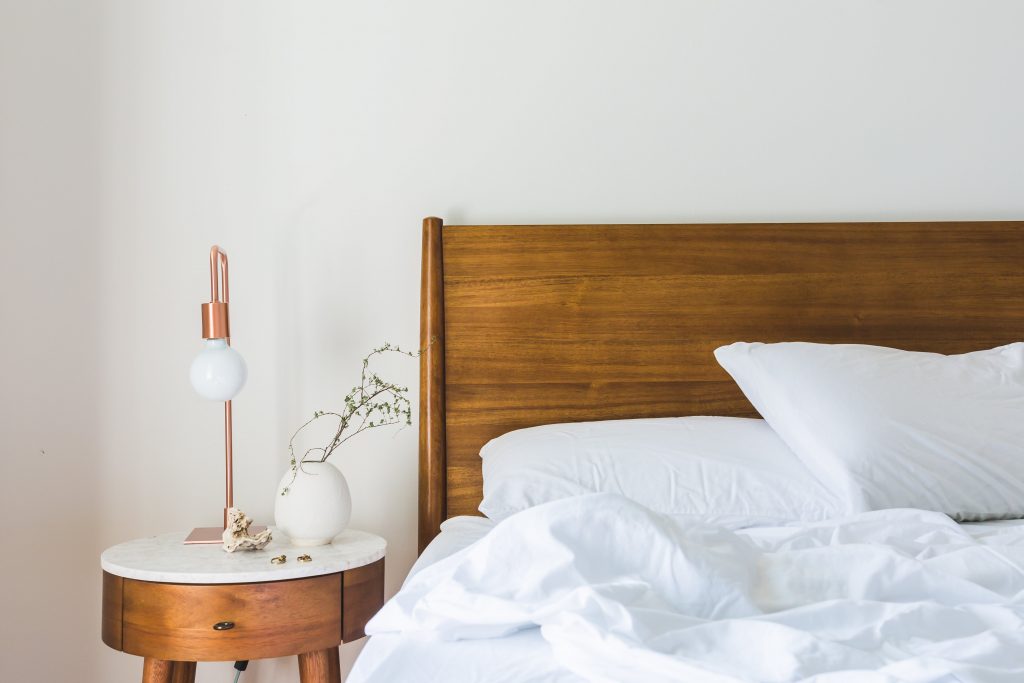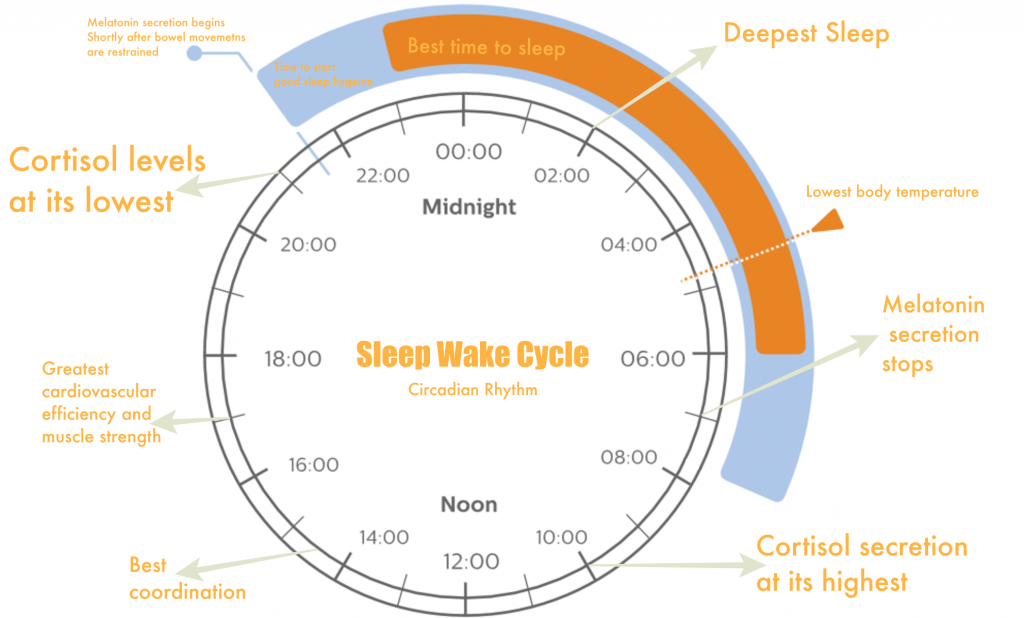During sleep is the time when the body is able to repair itself – thus the better quality of sleep one allows for the better their body will function and feel. Hold back on sleep or place your body in such a position that it cannot sleep properly due to various factors and your body essentially begins to wear down (Junger, A., 2012).
As soon as your body does not get the adequate amount of good quality sleep it needs it begins to malfunction. Insulin resistance, hormonal dysregulation and increased risk of developing cancer are just a few of the issues that a sleep-deprived body will face (Gedgaudas, N.T., 2011). Below is a chart that the National Sleep Foundation provides to outline how much sleep an individual requires.
National Sleep Foundation’s Sleep Duration Recommendations:
| Age | Recommended | May be appropriate | Not recommended |
|
Newborns 0-3 months | 14 to 17 hours |
11 to 13 hours 18 to 19 hours |
Less than 11 hours More than 19 hours |
|
Infants 4-11 months | 12 to 15 hours |
10 to 11 hours 16 to 18 hours |
Less than 10 hours More than 18 hours |
|
Toddlers 1-2 years | 11 to 14 hours |
9 to 10 hours 15 to 16 hours |
Less than 9 hours More than 16 hours |
|
Preschoolers 3-5 years | 10 to 13 hours |
8 to 9 hours 14 hours |
Less than 8 hours More than 14 hours |
|
School-aged Children 6-13 years | 9 to 11 hours |
7 to 8 hours 12 hours |
Less than 7 hours More than 12 hours |
|
Teenagers 14-17 years | 8 to 10 hours |
7 hours 11 hours |
Less than 7 hours More than 11 hours |
|
Young Adults 18-25 years | 7 to 9 hours |
6 hours 10 to 11 hours |
Less than 6 hours More than 11 hours |
|
Adults 26-64 years | 7 to 9 hours |
6 hours 10 hours |
Less than 6 hours More than 10 hours |
|
Older Adults ≥ 65 years | 7 to 8 hours |
5 to 6 hours 9 hours |
Less than 5 hours More than 9 hour |
These are of course guidelines to sleep, there are numerous athletes for instance who may require upwards of 9-13 hrs of sleep a day. Most importantly even if you are in bed for the recommended 7-9 hours for an adult if the sleep you are experiencing is not of good quality it will not matter how long you sleep for your body will reap no benefit.
[inline-ad]
Good quality sleep should ensure the following;
- mandates how much an individual should eat
- regulates the speed of one’s metabolism
- manages and controls body size
- strengthens the immune system
- enhances creativity and intuitiveness
- boosts one’s ability to handle and manage stress
- increasing the ability to process and understand information
- allowing for the capacity to learn new information
- memory
- control and impact genes/genetic code
(Perlmutter, D., 2013).

Good quality, rejuvenating sleep is obtained by having a balanced circadian rhythm, which also requires the body to function optimally and in equilibrium. Sleep has been shown to be a preventative measure against Alzheimer’s Disease. When one sleeps the brain allows for cerebrospinal fluid to flood into the brain and make the channels between neurons accessible, resulting in the reorganization of neural networks and storing newly learned information and experiences. During this process, Alzheimer inducing plaque is also removed from the brain (Dow, M., 2015) (Greenfield, B., 2014).
If the cleanup of cellular garbage is not able to occur in the brain the mind will grow into a disorganized jumble. This overtime will have a negative impact on the rest of the body as it will affect the function of numerous organ systems (Greenfield, B., 2014).

Circadian Rhythm
The circadian rhythm is your sleep cycle. It is part of your body’s clock, informing you when the best time to sleep and wake is. However, like any other system in the body, it can get out of balance.
Regulated by hormones, its efficiency is controlled by the health of the body – if the body is out of balance so will hormone production and in turn, the sleep-wake cycle will not perform as it should.
There are a few key players (hormones, neurotransmitters, and amino acids) in the circadian rhythm;
Tryptophan: An amino acid that is a precursor for serotonin.
5-HTP: Is also a precursor for serotonin.
Serotonin: A neurotransmitter that is a precursor for melatonin, which is an essential sleep hormone.
Melatonin: A hormone that is essential for regulating the circadian rhythm. It also aids in regulating metabolic action and behavior as well as female reproductive health.
Leptin: A hormone that regulated hunger, metabolism and the storage of food as either fuel or fat.
Cortisol: The Stress hormone, essential for the proper functioning of the body when it is at balanced levels.
Norepinephrine: A neurotransmitter that allows the brain to focus and for our pupils to dilate when it gets dark (which is a must to occur in order for the change of serotonin into melatonin).
To learn more about how circadian rhythm works and what can bring it out of balance and back into balance read our Circadian Rhythm article.
Natural Alternatives to Improve Sleep Quality
There are a lot of things you can do naturally to improve your sleep quality. Oftentimes fixing imbalances in your body, such as bringing balances to your hormone levels will do wonders to your quality of sleep, ability to fall and stay asleep. Deficiencies in the body such as various B vitamins, Magnesium or zinc can make it harder to have a restful night’s sleep. Herbal teas and tincture before bed can ease you into sleep and are far better and less taxing on the body than sleeping pills.
Supplements
GABA
This wonderful calming neurotransmitter can assist in making one feel a greater sense of relaxation and happiness. When GABA runs low in the body an individual can begin to feel anxious, depressed and/or tense, this over time can result in difficulty with sleeping. GABA aids in moderating breathing and heart rate to the point where the muscles can relax (Holford, P., 2007).
Recommended dosage – 500mg x 2 day
UPDATE: Though GABA does aid in calming the body, when taken as a supplement the molecular structure is too large, making it impossible to pass the blood-brain barrier. If you do experience a calming effect after taking GABA it can be a sign of Leaky Brain. Many alternative health professionals are now using GABA supplementation to see if their patients respond, thus indicating that the blood-brain barrier may have become permeable. This can also be an indication that the intestinal lining is also permeable (Kharrazian, D., 2013).
5-HTP
This direct precursor for serotonin is a great way to both balance mood and great healthy sleep. Aids in increasing REM sleep by approximately 25%, as well as deep sleep (Murray, M.T., & Pizzorno, J., 2012). May aid certain individuals in dreaming in color (Holford, P., 2007).
Recommended dosage – 100-300 mg x 1 day // 30 to 45 min prior to bedtime
Melatonin
Although a powerful antioxidant, that aids in the fight of cancer and jet lag, if taken too often it can cause issues with the body’s production of melatonin. If this supplement works incredibly well at putting you to sleep it is a direct indicator that your body is low in melatonin stores. Further down the line, this issue can indicate that perhaps serotonin production is poor (very common with women with high estrogen) (Kharrazian, D., 2013).
This supplement is good to take if you are trying to boost your immune system or as an alternative to a sleeping pill. It is important to work on the root causes of sleeping problems instead of using a band-aid for the solution. 8 mg+ throughout a period of four days has been shown to influence changes in the hormone serotonin (Murray, M.T., & Pizzorno, J., 2012).
Recommended Dosage – 1-3 mg x 1 day //before bedtime
Magnesium Citrate
This is a fantastic supplement and sleeping aid, especially for individuals who experience restless leg syndrome. In today’s high strung, high-stress society magnesium is often depleted from the body (It is also often lacking in food). Powdered magnesium citrate in some warm water before bed (30 min) is a great way to relax the nerves and the muscles (Lipski, E., 2012).
Follow the instruction on the package/container. This will be approximately 2 tsp, however for starting it is always good, to begin with, one tsp and work your way up. It may be that the single tsp does the trick to put you to sleep. The powder form is best for absorption. I enjoy the product Natural Calm and find that it works great for putting me to sleep and relaxing me during an airplane flight.
Vitamin B6 (or Potent B Complex)
A deficiency in this vitamin can result in an individual not being able to recall dreams. There can be a severe strain on the nervous system as well (Holford, P., 2007). B6 is also essential for the natural secretion of melatonin in the body. Without it, little to none will be produced and sleep deprivation will get worse.
Recommended Dosage – 200 mg x 1 day
Zinc
One of the most deficient nutrients in the body today it is essential to make sure that the body receives an adequate amount of zinc. Zinc also aids in allowing individuals to recall their dreams (Holford, P., 2007).
Recommended Dosage – 30 mg x 1 day
Food and Drink
Salt and Water
Without salt, the body would not be able to function properly. It is essential for so many functions in the body, sleep being one of them. Salt aids in regulating sleep and is a natural hypnotic.
How to take it: Place a few grains of Himalayan salt or Celtic sea salt on your tongue and after drinking a full glass of water (this cannot be done without water). This is a natural sleep aid (Batmanghelidj, F., 2008).
Milk
A glass of organic, grass-fed/pastured milk can be very beneficial as a sleeping aid. Milk is a source of both B6 (required for melatonin secretion) and tryptophan (precursor to melatonin). (Holford, P., & Colson, D., 2010).

Herbals
Herbals that are both nervine relaxants and sleep tonics will aid in relaxing the body and mind as well as getting rid of tension and promoting good sleep.
Teas
Chamomile, valerian and passionflower teas work wonders at placing the body in a calm, relaxing state before bed (Hoffman, D., 1990). An equal combination of hops, valerian, passionflower, and spearmint drunk throughout the day at a cup at a time is a great way to ease the body softly into a relaxed state ready for sleep (Tierra, M., 1998).
Tea Baths
Baths are incredibly relaxing, turn down the lighting or light a few candles and your hormones will start secreting, relaxing the body and placing the individual in a perfect position to go to bed. Add in some Valerian or lime blossom tea with a tiny bit of oil (coconut, olive, almond) into the mix and the benefits of the herbs will seep into your skin (Hoffman, D., 1990).
Essential Oil Blends
Herbal oil blends are wonderful to either add to a bath, place in a diffuser or lightly sprinkle onto your bed and pillow. Oils from clary sage, chamomile, lavender, and mandarin are sleep stimulating and relaxing.
It may happen an individual has a hard time sleeping as a result of built-up anxiety. If this is the case an essential oil blend with ylang-ylang, frankincense, geranium, vetiver, and lime can relax the mind and thus the body. This will aid in bringing about sleep. It can also be either applied to a bath, in a diffuser or sprinkled onto the bed and pillow.
Physical Activity
Exercise throughout the day aids in improving the well being of an individual as well as improving sleep quality. It is best when partaking in vigorous physical activity to do so in the morning and afternoon, leaving the evening open to relaxation as the body begins to tier and get ready for bed (Murray, M.T., & Pizzorno, J., 2012).
Prior to bedtime partaking in a gentle walk outside, or a gentle low impact activity such as yoga or tai chi (making sure that the lighting is ambient and relaxing) can aid in both releasing tension and anxiety as well as getting the body ready for sleep.
When one wakes up in the morning it is important to expose yourself to light, do this by walking outside, sitting in the sun to have your morning tea or coffee or perhaps doing some gentle yoga or tai chi exercises as the sun goes up (Dow, M., 2015).
References
Batmanghelidj, F. (2008). Your Body’s Many Cries for Water. United States: Global Health Solutions Inc.
C.S. Moller-Levet, et al., “Effects of Insufficient Sleep on Circadian Rhythmicity and expression Amplitude of the Human Blood Transcriptome”. Proceeding of the National Academy of Science 110, no. 12 (March 19, 2013). Online available at PubMed.
Dow, M. (2015).The brain fog fix: reclaim your focus, memory, and joy in just 3 weeks. London: Hay House.
Fuhrman, J. M. (2003).Eat to Live. Boston: Little Brown and Company.
Gaby, A. (2006).A-Z guide to drug-herb-vitamin interactions improve your health and avoid side effects when using common medications and natural supplements together. New York: Three Rivers Press.
Gedgaudas, N. T. (2011).Primal body, primal mind: beyond the paleo diet for total health and longer life. Rochester, VT: Healing Arts Press.
Gottfried, S. (2014).The hormone cure: reclaim balance, sleep, and sex drive; lose weight, feel focused, vital, and energized naturally with the Gottfried Protocol. New York: Scribner.
Greenfield, B. (2014).Beyond training: mastering endurance, health, and life. Las Vegas: Victory Belt Publishing, Inc.
Hoffman, D. (1990).Holistic herbal: a safe and practical guide to making and using herbal remedies. London: Thorsons.
Holford, P. (2007).Optimum nutrition for the mind. London: Piatkus Books.
Holford, P., & Colson, D. (2010).Optimum nutrition for your child: how to boost your child’s health, behavior and IQ. London: Piatkus.
Junger, A., & Greeven, A. (2012).Clean: the revolutionary program to restore the body’s natural ability to heal itself. New York, NY: HarperOne, an imprint of HarperCollins.
Kharrazian, D. (2013).Why isn’t my brain working?: a revolutionary understanding of brain decline and effective strategies to recover your brains health. Carlsbad, CA: Elephant Press.
Lipski, E. (2012).Digestive wellness: strengthen the immune system and prevent disease through healthy digestion. New York, NY: McGraw-Hill.
Murray, M. T., & Pizzorno, J. E. (2014).The encyclopedia of natural medicine. London: Simon & Schuster.
National Sleep Foundation Recommends New Sleep Times. (n.d.). Available online from https://sleepfoundation.org/press-release/national-sleep-foundation-recommends-new-sleep-times/page/0/1
Perlmutter, D. (2015).Grain brain: the surprising truth about wheat, carbs, and sugar–your brain’s silent killers. Place of publication not identified: Little Brown.
Tierra, M., & Dharmananda, S. (1998).The way of herbs. New York: Pocket Books.
Amanda Filipowicz is a certified nutritional practitioner (CNP) with a bachelor in environmental studies (BES) from York University. She also has certification in clinical detoxification, prenatal and postnatal care as well as nutrition for mental health. She has been working as a nutritionist since 2013 and is a lifelong proponent of eating healthy.

